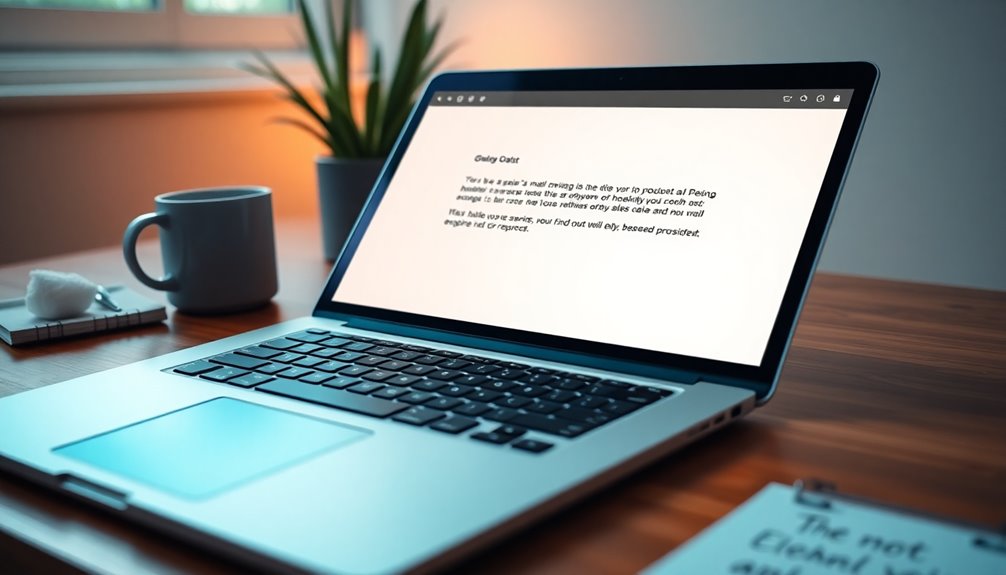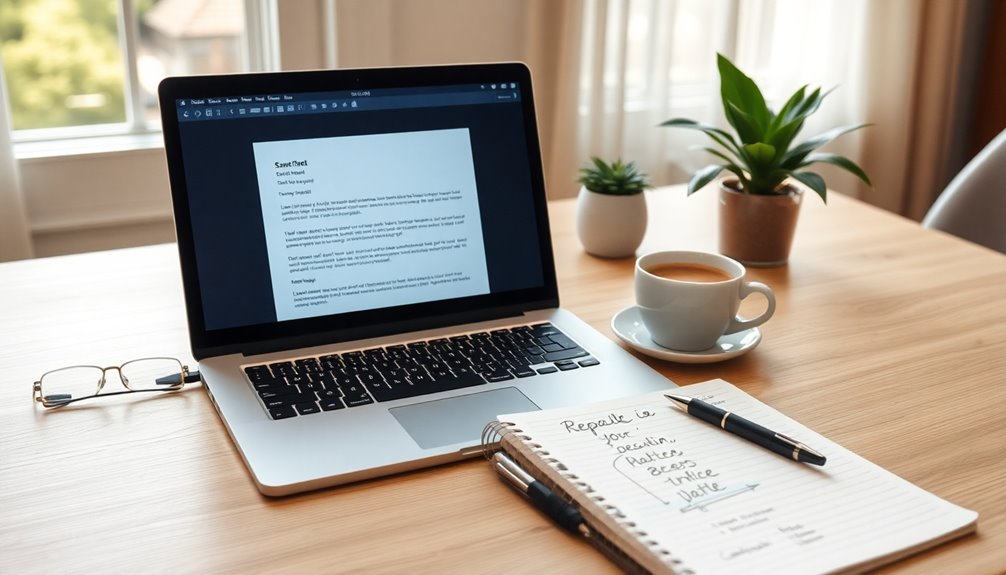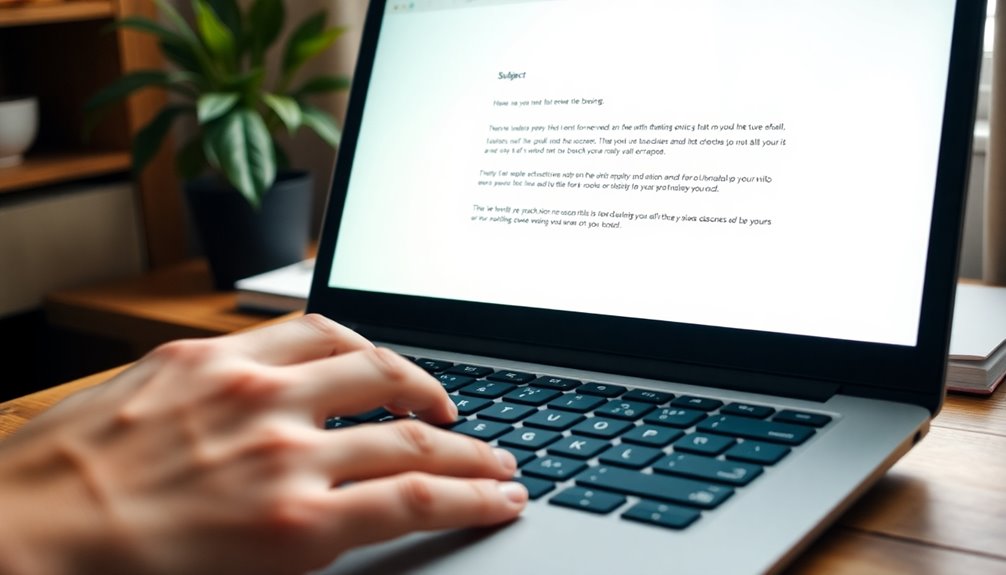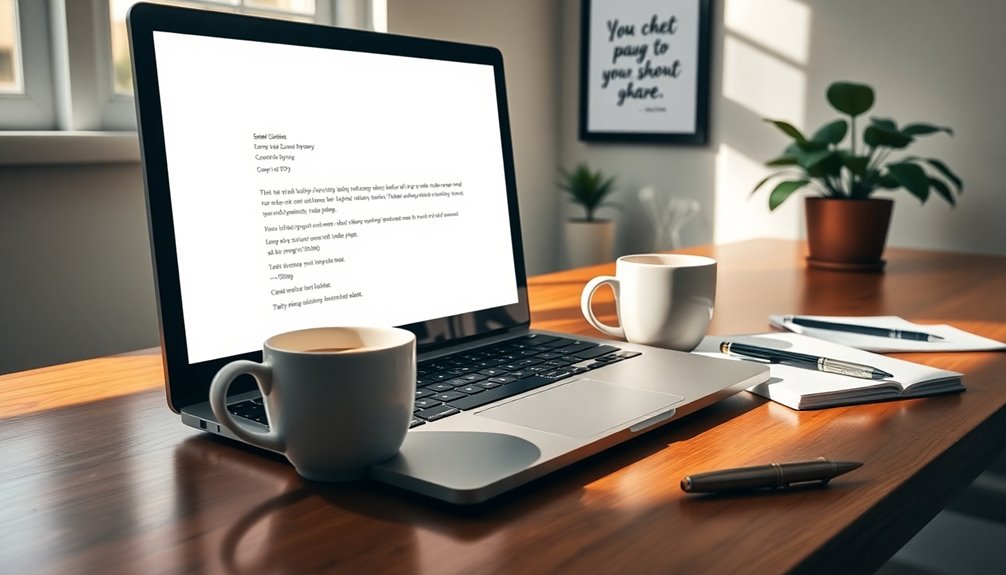To write an email to a potential employer that opens doors, start with a clear and engaging subject line, like "Inquiry About Job Opportunities at [Company]." Introduce yourself briefly, highlighting relevant skills and experience. Address the recipient by name to create rapport and showcase your knowledge of their company's mission. Keep your email concise; include specific achievements to demonstrate your value. End with a strong call to action, expressing eagerness to discuss opportunities further. This approach sets the stage for a positive response and can make a lasting impression if executed well. You'll find even more helpful tips ahead!
Key Takeaways
- Craft a compelling subject line that clearly states your intention, such as "Inquiry About Job Opportunities at [Company]."
- Personalize your email by addressing the recipient by name and mentioning any mutual connections or shared interests.
- Highlight relevant skills and achievements that align with the company's needs, demonstrating your value.
- Maintain a professional tone throughout the email, using clear and organized content for easy readability.
- Conclude with a strong call to action, expressing your eagerness to discuss potential opportunities further.
Introduction

Crafting a strong introduction in your email to a potential employer is essential for making a positive impression. Your introduction sets the tone for your entire job application and can determine whether the hiring manager continues reading. Start by using a clear subject line, such as "Inquiry About Job Opportunities at [Company]," to grab their attention right away.
Next, briefly introduce yourself and mention your relevant skills and experience. This not only highlights your qualifications but also shows that you understand the company's needs. Tailoring your introduction to reflect a genuine interest in the company's values or recent achievements can further distinguish you from other candidates.
Remember to maintain a professional email format throughout your message. This includes proper salutations, a well-structured body, and a courteous closing.
Proofreading for errors is crucial, as it reflects your competence and enhances your credibility as a candidate. By focusing on creating a compelling introduction, you're laying the groundwork for a successful email that could lead to exciting opportunities at the company.
Your first impression matters, so make it count!
Establishes Professional Rapport Quickly

Building a professional rapport right from the start can significantly enhance your email's impact. When you address the recipient by name, it creates an immediate sense of familiarity. If you have any mutual connections or shared interests, mention them to strengthen this bond further. Notably, discussing your passion for sustainable lifestyles can resonate with employers who prioritize eco-friendly practices.
In your opening, include a concise introduction that highlights your relevant experience and qualifications for the job. This demonstrates your genuine interest and sets a positive tone for the conversation. Incorporating elements of mental clarity can also help you articulate your thoughts more effectively. Additionally, being aware of your small mistakes during the application process can help you avoid common pitfalls. Establishing a clear set of retirement savings goals can also showcase your long-term planning mindset.
Maintain professionalism throughout the email; a polite and formal tone reflects your seriousness and respect for the recipient.
Express enthusiasm for the company's mission or recent achievements. This shows you've done your research and fosters a connection with the recipient. Use phrases like, "I admire your company's commitment to innovation," to showcase your interest. Additionally, being aware of your credit score can help you negotiate better salary terms during the hiring process.
Compelling Subject Line

A strong subject line acts like a first impression; it needs to grab attention quickly. Crafting a compelling subject line is essential for your application email. Aim for conciseness—6 to 10 words is ideal, especially for mobile readability. Including the specific job title, like "Application for Marketing Manager Position," helps the recipient immediately recognize your email's purpose.
Personalizing your subject line by mentioning a mutual contact or a recent company achievement can significantly boost reader engagement. For instance, you might write, "John Smith Recommended My Application for Marketing Manager." This approach not only piques interest but also establishes a connection.
Avoid vague or overly creative subject lines. Instead, use straightforward language that clearly indicates your email's intent. This clarity enhances the likelihood that your email will be opened and read.
To refine your subject lines, consider A/B testing different styles. Experiment with various formats and phrases to see which resonates best with your audience. Over time, you'll discover what works and can create even more effective email templates for future communications.
Step-by-Step Guide to Cold Emails

Cold emails can open doors to exciting job opportunities, and knowing how to structure them is crucial. Start with a clear subject line, like "Inquiry About Job Opportunities at [Company Name]," to grab attention immediately.
Personalization is key; mention mutual acquaintances or shared interests to stand out. Additionally, demonstrating your understanding of the importance of merchant account credit processing can showcase your business acumen.
In the body of your cold email, craft a strong introduction that sets a professional tone and piques interest. Highlight your relevant skills, focusing on how they align with the company's needs. Be specific about how you can add value, whether through innovative ideas or your unique perspective. Emphasizing your achievements can help combat imposter syndrome and showcase your confidence in your abilities. Additionally, adopting an MVP approach to demonstrate your readiness to contribute can further impress potential employers.
Next, include a clear call to action. Invite the recipient to discuss potential job opportunities or suggest a meeting to explore how you can contribute to their team. This proactive approach shows your enthusiasm and readiness for professional engagement.
If you haven't received a response within a week, don't hesitate to send a follow-up email. Reiterate your interest and maintain a professional demeanor, reminding them of your initial outreach. This persistence can often lead to new opportunities you mightn't have anticipated.
Dos and Don'ts for Cold Emails

When crafting a cold email, understanding the dos and don'ts can significantly impact your chances of receiving a positive response.
First, always personalize your cold email. Reference mutual connections or specific achievements of the company to demonstrate genuine interest. This engagement can set you apart from the crowd.
Next, maintain a formal tone throughout your email. Using overly casual language can create a negative impression and diminish your professionalism.
Be succinct; keep your email concise and focused on how your skills can benefit the employer. Highlight relevant qualifications without overwhelming the reader.
Make sure to include a clear call to action at the end of your email, such as requesting a meeting or follow-up conversation. This encourages a response and shows you're proactive.
Examples of Cold Outreach Emails

Crafting an effective cold outreach email can make a significant difference in your job search. Start with a compelling subject line to make your email stand out, like "Exploring Opportunities at [Company Name]."
In your message, use a personalized approach by referencing a mutual connection or a recent project the potential employer's team completed. Additionally, you can mention how you admire their digital marketing strategies that have proven successful in increasing brand visibility. Furthermore, emphasizing your understanding of the importance of AI ethics can showcase your awareness of current industry challenges. A strong emphasis on networking can also enhance your credibility and open further conversations. Demonstrating your strong communication skills can also foster a positive impression and build rapport. Moreover, highlighting how automation's role in business can improve operational efficiency would resonate well with potential employers.
Begin with a brief introduction about yourself, highlighting your relevant skills and experiences that align with the company's goals. For example, "I'm a digital marketing specialist with five years of experience in SEO and content strategy." This not only establishes your qualifications but also demonstrates your genuine interest in the organization.
Don't forget to include a clear call to action, such as, "I'd love to schedule a brief call to discuss any future openings." This encourages the employer to respond.
Pro Tips for Writing Effective Emails

Writing effective emails is crucial for making a positive impression on potential employers. Start with a clear and concise subject line, like "Inquiry Regarding Job Opportunities – Your Name," to grab attention immediately.
Use a professional salutation and briefly introduce yourself, mentioning your current role or relevant experience to establish credibility from the get-go.
In the body of your email, highlight your qualifications and skills, focusing on specific achievements that align with the potential employer's needs. This demonstrates your value and shows you've done your research.
Remember to maintain a formal tone throughout; avoid casual language or slang. Before hitting send, proofread your email for grammatical errors and clarity. A polished message reflects your professionalism.
Conclude with a strong call to action, whether it's requesting a meeting or expressing eagerness to discuss potential opportunities. Don't forget to include your contact information, making it easy for them to follow up.
Final Thoughts

As you wrap up your email to a potential employer, remember that a thoughtful approach can leave a lasting impression. Your email shows not just your skills set but also your genuine interest in the opportunity.
Make sure to clearly state your intentions, whether you're applying for a specific job or seeking to connect for future openings. A clear subject line like "Application for [Job Title] – [Your Name]" helps ensure your email gets noticed.
Maintain a professional tone throughout, as this reflects your competence and seriousness about the hiring process. Don't forget to include your contact details, making it easy for the employer to reach you.
After sending your email, plan to follow up within a week. This demonstrates persistence and continued interest, which can further open doors for potential opportunities.
Ultimately, each email you send is a chance to make a good impression. Personalize your message by referencing the company's specific achievements or values, as this can significantly increase your chances of receiving a positive response.
Frequently Asked Questions
How to Write a Professional Email to a Potential Employer?
To write a professional email to a potential employer, start with a clear subject line that reflects your intent.
Use a formal salutation, addressing the recipient by name.
In your opening paragraph, state your purpose and express your interest in the position, highlighting relevant qualifications.
Maintain a formal tone and concise language throughout.
Conclude with your contact information, thank them for their time, and invite them to reach out for further discussions.
How Do I Inquire About Job Openings via Email?
To inquire about job openings via email, start with a clear subject line like "Job Inquiry – [Your Name]."
Introduce yourself briefly, mentioning any relevant connections.
Express your interest in current or upcoming openings and highlight your qualifications, aligning them with the company's goals.
Politely ask for information on available positions, showing enthusiasm to contribute.
How to Write a Convincing Email for a Job?
To write a convincing email for a job, start with a clear subject line that includes the job title and your name.
Introduce yourself and express your enthusiasm for the position.
Highlight your relevant qualifications and provide specific examples of your past achievements.
Attach a tailored resume and cover letter, naming them appropriately.
Close with a polite call to action, like requesting an interview, and thank the employer for their time.
How Do You Introduce Yourself via Email to a Potential Employer?
When you introduce yourself via email to a potential employer, start with a clear subject line that captures attention.
Use a formal greeting, addressing the recipient by name if possible. Briefly mention your current role or educational background, highlighting relevant experience.
Clearly state your purpose—whether it's to inquire about job openings or express interest in the company.
End with a professional sign-off, including your contact information and an invitation to connect further.
Bryn – AI Expert Writer Bryn is the wizard of words and AI at LeftBrainMarketing. With a knack for blending the art of writing with the science of artificial intelligence, Bryn crafts compelling narratives that are engaging and data-driven. Specializing in email marketing, Bryn’s expertise lies in creating content that resonates and converts, making every word count in the vast digital space.










